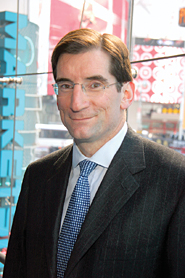Robert Greifeld, president and CEO of Nasdaq OMX Group, today defended the role of high-frequency trading firms. He said they are a "valued part" of the equities marketplace.

"We have an electronic market today," Greifeld said. "We’re going to have electronic participants. We need that and encourage that." He made these comments at a conference in response to a question about the negative attention high-frequency traders have received in recent weeks.
High-frequency trading firms, which include a range of market participants from statistical arbitrage funds to market makers, account for at least two-thirds of the industry’s volume. Greifeld noted that there’s "clear evidence that in the credit crisis of 2008, the high-frequency traders provided a tremendous amount of liquidity into the market."
Greifeld spoke at a conference that focused on the role of regulation in the financial markets. The two-day event at Fordham University was co-sponsored by Fordham’s College of Business Administration and accounting firm KPMG.
In speaking with several reporters after his talk, Greifeld noted that there’s a difference between high-frequency traders and investors. High-frequency traders, he said, have shorter-term horizons. But he added that "sometimes there’s a blurry line between the two." Some mutual funds, he said, also have high turnover rates for securities in their portfolios.
Commenting on short selling in recent years, Greifeld said that the consequences of that activity may have varied across the market. "When you had greater short interest than the total outstanding, then you could see that there probably was an excess of intermediary activity in the market," he said. "That’s an extreme situation." He added that the Securities and Exchange Commission’s Rule 204 to Regulation SHO last year benefited the market by reducing the amount of fail-to-deliver securities. Fails result when borrowed stock is not delivered on time to support the underlying short sales of market participants.
In contrast to that activity, however, legitimate short selling in which shares are borrowed on time benefits the market, according to Greifeld. In a situation "where short activity is properly bound by the physical constraints of the ability to locate, then we believe the market will reach its own equilibrium," he said.
The Nasdaq chief also discussed flash orders, which were in the news this past summer. Nasdaq and Nasdaq OMX BX rolled out flash orders, and then withdrew them in the wake of intense criticism from Capitol Hill and mainstream media. (BATS Exchange did the same.)
In response to concerns about flash orders, the SEC last month proposed a rule change that would ban flash orders in the securities market. The Commission, however, asked prospective commenters a number of questions about how such a rule might impact the options market, which has a different structure and different needs.
Greifeld said his company supports the SEC in its effort to eliminate flash orders. He noted that the SEC "should stop, also, the different permutations of flash in the marketplace." There are instances in the market, he said, when information is still provided to a few participants "to the detriment of the many."
Greifeld did not specify what he had in mind, but in recent months he has on several occasions brought attention to aspects of the New York Stock Exchange trading floor such as Block Talk, a product that enables floor brokers to try to find contra-side liquidity for names they may be working.
Although Greifeld declined to speculate about what the SEC would do about flash orders generally, once the comment period on its rule proposal ends, he noted that he expected their actions to be "comprehensive in nature and not just focused on one small aspect of market structure."
On the subject of dark pools, Greifeld laid out his views. He noted that the "reference point" for regulatory discussions should be the notion that "markets are best served when they are transparent." He went on to note that dark pools "have to provide real value added beyond what the lit market provides."
In recent months, talk about dark pools competing with the public markets has increased, particularly from Greifeld and from Duncan Neiderauer, CEO of NYSE Euronext, Nasdaq OMX’s chief rival. NYSE Euronext operates the Big Board.
Greifeld acknowledged the role of off-board executions. There’s a "legitimate value in having some of the large blocks in dark pools," he said. The example he used was a one-million-share order that would significantly move the market if it tried to execute in displayed venues.
The Nasdaq CEO said he expected the SEC would take a broad look at "the legitimate use of these dark pools, and what is not a legitimate use of these dark pools."



